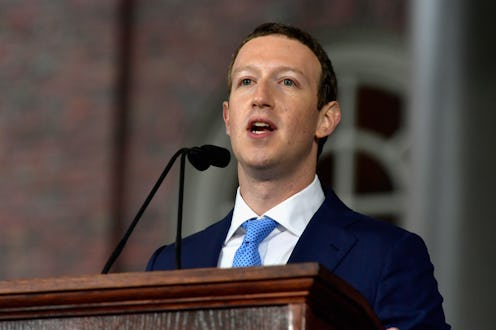News
Read How Mark Zuckerberg Will Explain That Massive Facebook Data Theft To Congress

Facebook's co-founder and CEO will appear before Congress this week to answer questions about a data leak that impacted 87 million Facebook users. But what will Mark Zuckerberg say to Congress? In his prepared testimony, released Monday by the House Energy and Commerce Committee, he apologizes for failing to take "a broad enough view" of the tech company's responsibility to protect users' privacy. "It was my mistake, and I’m sorry," he wrote.
Zuckerberg is scheduled to address both the Senate Judiciary and Commerce Committees on Tuesday, followed by a hearing with the House Energy and Commerce Committee on Wednesday. Members of Congress requested that he visit Capitol Hill following reports that Cambridge Analytica, a data firm that worked on President Trump's 2016 campaign, accessed millions of Facebook users' personal information.
For the past month, Zuckerberg and other Facebook executives have done damage control by explaining the ways in which they're working to protect user data. Zuckerberg's testimonies will likely offer more insight into how the company will treat data going forward.
"I started Facebook, I run it, and I’m responsible for what happens here," Zuckerberg's prepared statement reads. "So now we have to go through every part of our relationship with people and make sure we’re taking a broad enough view of our responsibility."
Zuckerberg’s statement outlines the same timeline he initially made public in a March Facebook post. In 2013, Cambridge University researcher Aleksandr Kogan created a quiz app that allowed him to access participating users’ Facebook data, as well as the data of their friends. In 2014, Facebook disabled apps like Kogan’s from accessing users’ information without that user personally authorizing the app. The following year, Facebook learned that Kogan had given the user information he obtained to Cambridge Analytica. Finally, last month, news reports revealed that Cambridge Analytica might not have deleted the data as it told Facebook it had two years prior.
The CEO's prepared testimony then gets into what Facebook is doing to prevent similar breaches. As Zuckerberg put it, "We have a responsibility to make sure what happened with Kogan and Cambridge Analytica doesn’t happen again."
For starters, Facebook is reducing how much personal information is available to apps, removing apps' access to users' data after they haven't used the app for three months, and requiring developers to sign contracts outlining what they must do in order to ask users' for access to their data. Zuckerberg also wrote that Facebook is investigating "every app that had access to a large amount of information before we locked down our platform in 2014" and working to help users understand which apps they've allowed to access their information.
His prepared testimony isn't limited to the Cambridge Analytica scandal, either. Zuckerberg also offers an explanation of Facebook's role in Russian election interference. He admitted that his company was too slow in responding to Russian interference and is now designing new technology to prevent the same thing from happening again.
"We will continue working with the government to understand the full extent of Russian interference, and we will do our part not only to ensure the integrity of free and fair elections around the world, but also to give everyone a voice and to be a force for good in democracy everywhere," Zuckerberg wrote.
Although Zuckerberg was forthcoming with several explanations and apologies, a major question remains: Why did Facebook take so long to respond to news of both the Cambridge Analytica leak and Russian interference in the 2016 election? Members of Congress may very well ask him for an answer in person this week. Time will tell whether or not they find his answer sufficient.